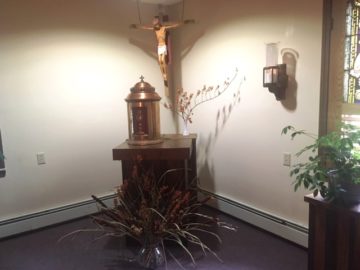With grateful hearts we offer a Franciscan Gospel reflection and questions written by Fr. Paul Gallagher, OFM for your prayer. They are edited by Franciscan Sister of Christian Charity Sister Anne Marie Lom and Joe Thiel. The excerpts from the Sunday readings are prepared by Joe Thiel. To read or download the complete pdf with excerpts for your prayer, please click here: Franciscan Gospel Reflection October 27 2019. Excerpts are from the Lectionary for Mass for Use in the Dioceses of the United States of America, second typical edition © 2001, 1998, 1997, 1986, 1970 Confraternity of Christian Doctrine, Inc., Washington, DC. Used with permission. All rights reserved. No portion of this text may be reproduced by any means without permission in writing from the copyright owner. Photos: Franciscan Sisters of Christian Charity House of Prayer
Luke 18:9-14
He [Jesus] then addressed this parable to those who were convinced of their own righteousness and despised everyone else.
“Two people went up to the temple area to pray; one was a Pharisee and the other was a tax collector. The Pharisee took up his position and spoke this prayer to himself, ‘O God, I thank you that I am not like the rest of humanity–greedy, dishonest, adulterous–or even like this tax collector. I fast twice a week, and I pay tithes on my whole income.’ But the tax collector stood off at a distance and would not even raise his eyes to heaven but beat his breast and prayed, ‘O God, be merciful to me a sinner.’ I tell you, the latter went home justified, not the former; for everyone who exalts himself will be humbled, and the one who humbles himself will be exalted.”
Background:
The gospel text from last week began “Then Jesus told them a parable about the necessity for them to pray always without becoming weary.” (Luke 18:1) The parable itself focused on a widow who broke with socially accepted behavior to directly confront a judge who was not concerned with protecting the rights of the vulnerable. After Jesus told that parable, he asked, “But when the Son of Man comes, will he find faith on earth?” (Luke 18:8b) After putting that question on the hearts of the disciples, Jesus tells the parable for this week, which focuses on the interior attitude one should bring to prayer.
The Pharisees at the time of Jesus took their relationship with Yahweh seriously. It was their practice to go beyond what was normally required by the religious standards of the day. They also tried to live out their relationship with Yahweh in their daily life. They were not looked on as religious leaders but respected members of the community. However, after the destruction of the temple, they clashed with the Christian community. It was during this period that the gospels were compiled, and it is this latter attitude that is reflected throughout the gospels.
The tax collectors were generally shunned by the people of Jesus’ day because they collected money for the oppressing government of Rome. They were not paid a wage, and therefore they collected more than was required, in order to support themselves. If a tax collector desired to repent of his sin, he was required to return all the tax money he had collected, plus twenty percent. The longer one was a tax collector, the harder it would become to accomplish this requirement. However, texts like this suggest that tax collectors did respond to the messages of John the Baptist and Jesus. Verse 14 states that this tax collector stood at a distance and beat his breast. In this culture men did not beat their breast. This was a gesture reserved for women. For a man to beat his breast would only be appropriate as an expression of the deepest sorrow.
In the parable, the Pharisee is a model in the way he lives his life. That is also expressed in the way that he prays. His posture is according to the custom of the day. In his daily life, he has not entertained greed, dishonesty or adultery. His personal practice exceeds what is required. Jews were required to fast on the Day of Atonement, but he fasts twice a week. They were only required to pay taxes on what one earns, but he pays tax on all that he owns.
The tax collector for his part prays for mercy, and makes no effort to correct the Pharisees’ description of him. It is presumed that he has been accurately described. The differences between the two are also expressed in their manner at prayer. The tax collector stands at a distance, does not dare look toward heaven, and beats his breast. His awareness of his relationship with God and his fellow Jews leads him to acknowledge his sin and to ask for mercy.
The Pharisee’s life is the opposite of the tax collector’s, and so is his prayer. This means he drew close, looked toward heaven, and raised his arms toward God when he prayed. His prayer is one of gratitude. But it is of gratitude that he is not like others, and it is about what he has accomplished. It is not about Yahweh and what Yahweh has done in his life.
In the final verse, Jesus uses the opposites that have been the basis of the parable to make his point. God looks upon both the Pharisee and the tax collector from the exact opposite perspectives from which each of them has looked upon themselves. The Pharisee looks upon himself and the way he lives his life as making him worthy to stand before God and pray. The tax collector looks at himself and the way he lives his life and sees nothing that makes him worthy to come before God. Both the Pharisee and the tax collector have based their approach to God on their view of their own lives. But the opposite is true for God. Each of their relationships with God is based not in who they are but who God is. This is the God who created both of them and called each of them into a relationship. Therefore, God’s mercy freely flows on the tax collector who asks for mercy. But the Pharisee, who in his prayer took credit for his virtue, asked for nothing from God and in the parable he receives nothing.
Reflection Questions:
1. When you think of yourself in relationship to your peers…
2. When you think of yourself in relationship to God…
3. What does where you sit in church say about your desire to be in relationship to God and to those who have gathered with you?
4. What does where you sit in Church say about your understanding of God’s desire?
5. What parts of the Mass or public prayer are most engaging for you?
6. O God, I thank you that I am…
7. O God, be merciful to me for I am…
8. Why would Jesus address those who are convinced of their own righteousness?
9. Can you talk with God now about what this parable is saying to you, what kind of relationship God desires to have with you, or how you hope to come before God during the coming week?





